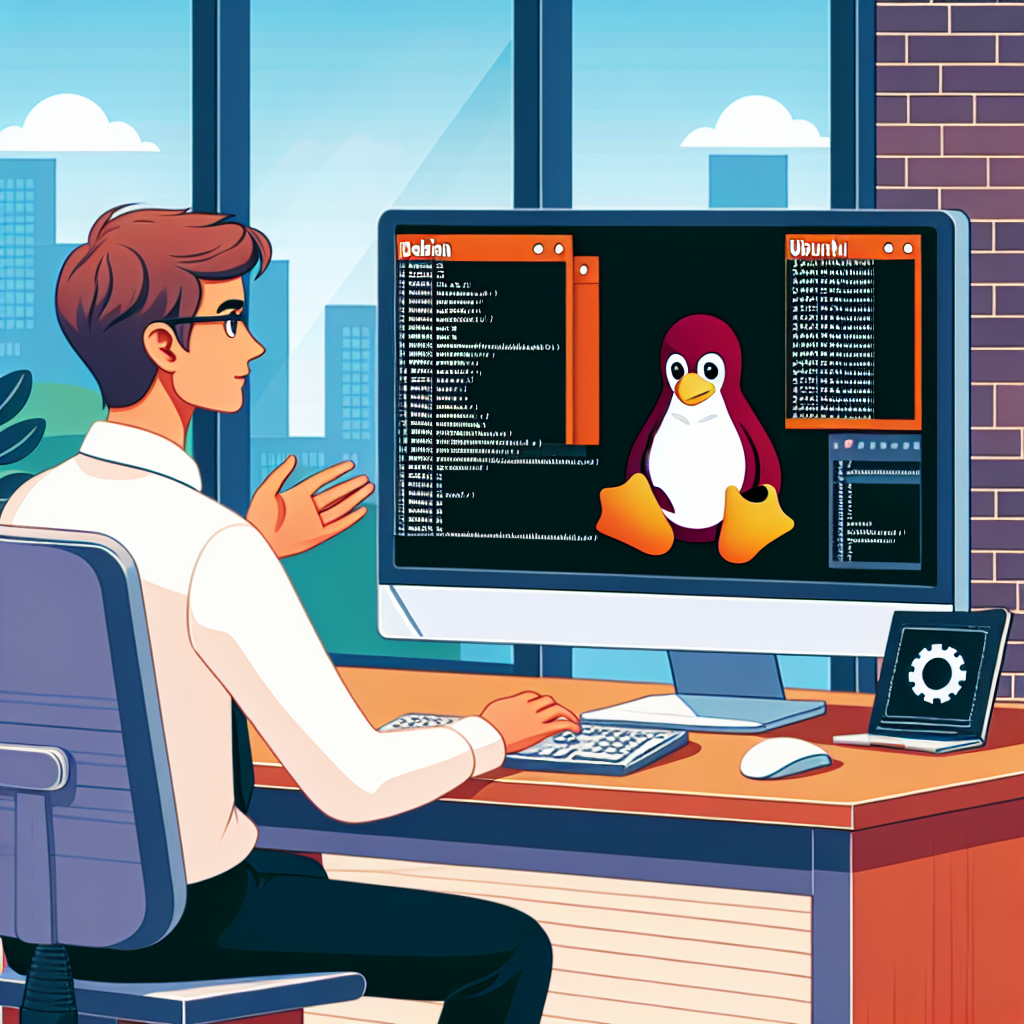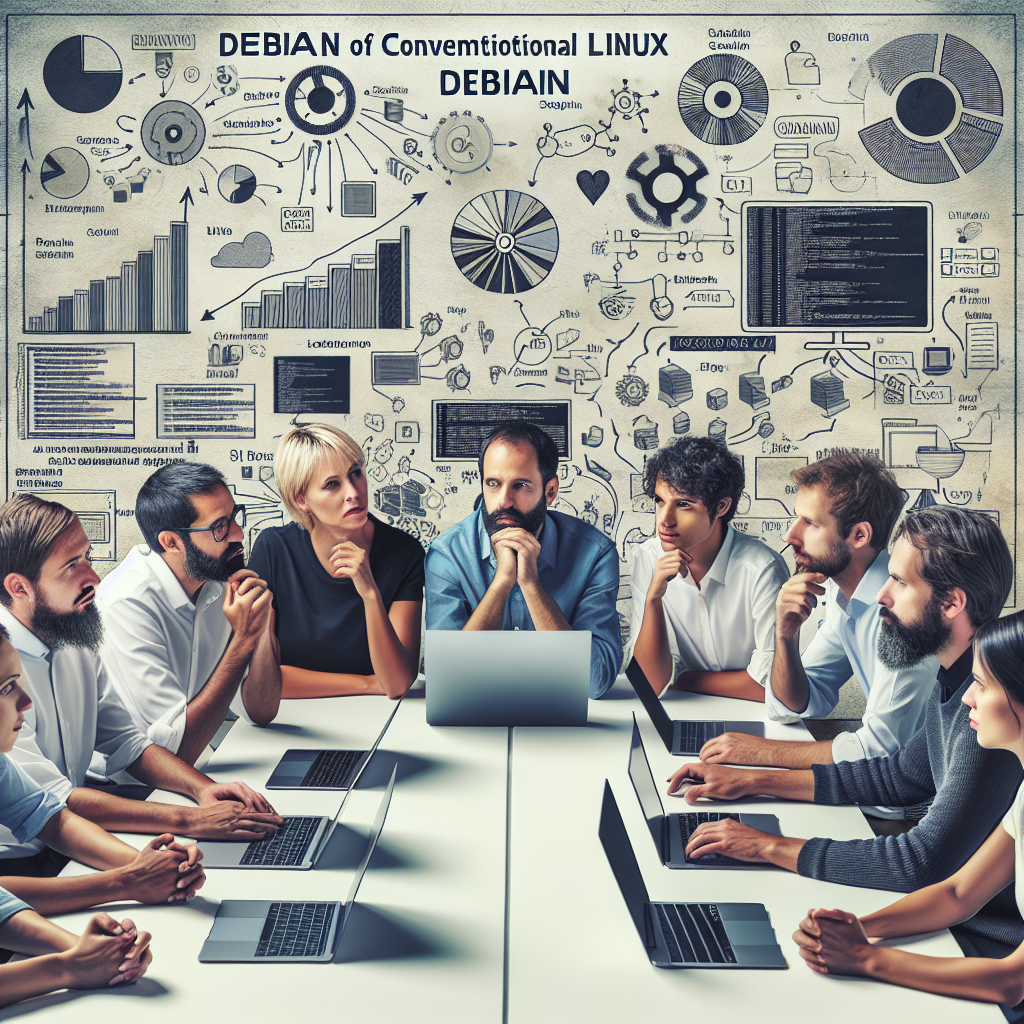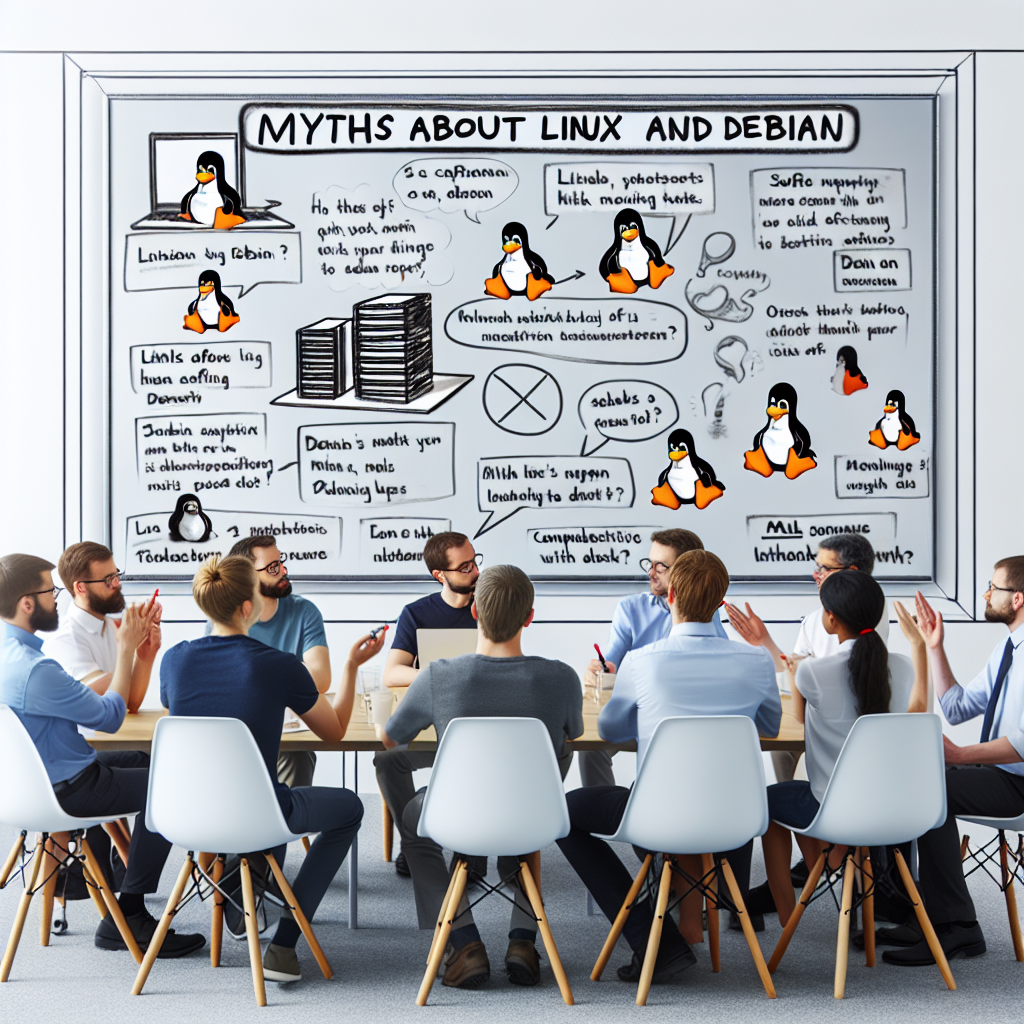Discover the Differences Between Linux, Debian, and Ubuntu!
What is the Difference Between Linux and Debian: Understanding the Core Distinctions

When diving into the world of operating systems, many people find themselves asking, what is the difference between Linux and Debian? ⭐ This inquiry is common, especially among those new to the tech landscape. Let’s break it down in a snippet-sized, relatable way.
Linux: The Foundation of Many Systems
Linux is an open-source operating system kernel first released in 1991. Think of it as the underlying framework that allows various distributions (distros) to operate. If you visualize Linux as the trunk of a tree, the branches symbolize the different distros, including Debian. ⭐
Debian: A Distinct Distribution
Debian, introduced in 1993, is a specific distribution that uses the Linux kernel as its base. It is known for stability and a robust package management system, providing an excellent environment for a variety of applications. ✨
Key Differences
- Development Model: Linux is the kernel, while Debian is a complete operating system that includes the kernel and numerous additional packages. ⭐️
- Release Cycle: Debian follows a more conservative and slower release cycle compared to many other distributions, focusing on stability. Linux can evolve rapidly, leading to innovative changes. ⭐
- Package Management: Debian employs the Advanced Package Tool (APT), making software management seamless. In contrast, different Linux distros may use varied package managers. ⭐
Real-Life Example
Imagine if you’re a business owner looking to set up a server for your online store. ⭐ Opting for Debian means you get a stable environment perfect for running applications smoothly, while Linux allows you to customize the setup, giving you flexibility. Companies like yours often value these characteristics, especially when handling sensitive customer data.
Common Misconceptions
Many users wonder whether Debian is “better” than other Linux distributions. The truth is, its about what is the difference between Linux and Debian in your specific context. Users who prioritize stability might lean towards Debian, while those seeking cutting-edge features might enjoy distributions like Arch Linux. ⚖️
Statistical Insights
- Approximately 60% of servers run on Linux. ⭐
- Debian is one of the most popular Linux distributions, with around 8% of Linux users preferring it. ⭐
Expert Insights
Our specialist Alexandr often advises clients, “Choose Debian if you need something user-friendly and reliable, and opt for general Linux if youre looking for a vast range of functions.” His 20 years of experience in the IT field reinforces this insight. ⭐
Why This Matters to You
Whether you’re venturing into software development or managing web infrastructure, understanding the nuances of operating systems is critical. Selecting the right system can enhance your software development experience and operational efficiency significantly. ⭐️
At Zuniweb Studio, we’ve curated a full spectrum of IT services, offering everything from software development to technical support, all in one convenient place. There’s no need to juggle multiple companies for your IT needs! ⭐
Curious about how we can help streamline your IT infrastructure? Feel free to reach out directly at Go Telegram Chat or visit zuniweb.com to sign up for our services today!
Frequently Asked Questions
- Can I use Debian for my business servers? Absolutely! Debian is known for its robustness and stability, making it a great choice for business applications.
- What types of software can run on Linux? Most software that runs on any operating system can also be adapted to run on Linux, ranging from office suites to development tools.
- Is Debian suitable for beginners? While Debian can be used by beginners, some may prefer other distributions like Ubuntu for a more straightforward introduction.
- How does Linux handle security? Linux has a strong security model and is less prone to viruses compared to other operating systems, thanks to its permissions system.
- What is the best use case for Debian? Debian is perfect for servers, development environments, and users who appreciate a stable base system for their applications.
- Can I customize Debian? Yes, Debian can be tailored to suit your needs significantly, from desktop environments to server configurations.
- What’s the difference between Debian and Ubuntu? While both are Debian-based, Ubuntu focuses more on user-friendliness, while Debian emphasizes stability and versatility.
- How often should I update my Linux system? Regular updates are recommended to ensure security and performance, ideally every few weeks or as updates are released.
- Are there free support options for Debian? Absolutely! The community around Debian offers extensive documentation and forums for troubleshooting.
- How can I contact Zuniweb Studio? You can call us at Go Telegram Chat or visit our website at zuniweb.com to explore our services.
What is the Difference Between Debian and Ubuntu? A Comparative Deep Dive
contact us
Game apps can be really expensive to build and maintain, but don’t worry, we do everything in our mix to ensure that you get the best, for the best cost.

As you delve into the Linux ecosystem, you might find yourself pondering: what is the difference between Debian and Ubuntu? ⭐ This is a common question and an essential one for anyone considering which distribution to use. Lets break this down and explore the nuances in an engaging way!
Understanding Debian and Ubuntu
Debian is a longstanding and respected Linux distribution known for its stability, while Ubuntu is a derivative of Debian that aims to provide a more user-friendly experience. Think of Debian as the solid, dependable elder sibling, while Ubuntu is the adventurous younger sibling bringing new, fun features to the table. ⭐
Key Differences
- Release Cycle: Debian follows a more conservative release cycle, prioritizing stability over new features. Treat this like a tortoise that paces itself for the long run. In contrast, Ubuntu adopts a regular six-month release cycle, akin to a hare racing ahead to deliver new features. ⭐⭐
- Target Audience: Debian caters to users who appreciate control and stability, often appealing to developers and system admins. Ubuntu, however, targets newcomers and non-technical users who seek ease of use. ⭐
- Desktop Environment: Ubuntu comes with a polished desktop experience out of the box, focusing on aesthetics and usability. Debian allows users to select their desktop environment more freely, offering choices like GNOME, XFCE, and KDE. ⭐
- Software Availability: Ubuntu includes proprietary drivers and software in its repository, catering to users looking for easy installation of third-party applications. Debian maintains a strict policy on free software, providing a more open-source-friendly environment. ⭐
Real-Life Example
Suppose youre a graphic designer looking to set up your workstation. If you choose Ubuntu, youll enjoy ready-to-go software installations and a sleek interface that reduces setup time. On the other hand, if you opt for Debian, youll appreciate the control and reliability, although you might spend extra time configuring your environment. ⭐
Statistical Insights
- Over 40% of Linux users choose Ubuntu for its user-friendly features. ⭐
- A study showed that 70% of server environments prefer Debian due to its stability. ⭐
User Testimonials
One of our clients, a startup founder, shared their experience with both systems: “I initially tried Debian but found Ubuntu’s support and community to be more helpful for my team’s learning curve. It made onboarding smoother for everyone!” This insightful feedback emphasizes Ubuntus accessibility for new users. ⭐
Expert Opinions
At Zuniweb Studio, our lead specialist Alexandr has some valuable advice: “If youre completely new to Linux, start with Ubuntu to get familiar with the environment. As you grow more comfortable, consider exploring Debian for greater control.” With over 20 years in the IT game, his insights can guide your decision-making effectively. ⭐
Why Choose Wisely?
The choice between Debian and Ubuntu can significantly impact your software development experience and the efficiency of your operations. By understanding what is the difference between Debian and Ubuntu, you can make an informed choice that aligns with your specific needs. ⚙️
If you’re still on the fence about which system suits your requirements better, don’t hesitate to reach out! At Zuniweb Studio, we offer expert consultancy services tailored to help you decide the best fit for your purposes. Just give us a call at Go Telegram Chat or visit our website at zuniweb.com to inquire about our services!
Frequently Asked Questions
- Is Ubuntu more beginner-friendly than Debian? Yes, Ubuntu is designed with user-friendliness in mind and includes helpful resources for beginners.
- Can I run both Debian and Ubuntu on the same machine? Absolutely! You can dual-boot them, allowing you to switch based on your needs.
- Which is better for servers, Debian or Ubuntu? Many organizations prefer Debian for its stability, but Ubuntu also has solid server options.
- What desktop environments can I use with Debian? Debian is flexible and supports various environments like GNOME, XFCE, KDE, and more.
- How often is Ubuntu updated? Ubuntu typically has a new version every six months, with LTS (Long-Term Support) releases every two years.
- Are updates easier on Ubuntu? Generally, yes. Ubuntu integrates proprietary updates seamlessly, while Debian requires more manual management.
- What are the security features in Debian and Ubuntu? Both distributions focus on security, but Debian is often seen as more stringent regarding package management.
- Can I install proprietary software on Debian? Yes, but it may require additional setup compared to Ubuntu which supports it out of the box.
- Is there a community support system for both? Yes, both distributions have vibrant community forums and documentation resources.
- How can I contact Zuniweb Studio for more information? You can call us at Go Telegram Chat or visit zuniweb.com for more information!
Why Businesses Should Care: Analyzing Myths About Linux vs. Debian
contact us
Game apps can be really expensive to build and maintain, but don’t worry, we do everything in our mix to ensure that you get the best, for the best cost.

In today’s digital age, understanding the difference between Linux and Debian isnt simply an academic exercise; its vital for businesses considering their IT infrastructures. ⭐ As organizations weigh their options, several myths cloud their judgment, often leading to misconceptions about these two platforms. Let’s clarify these myths and uncover why businesses shouldn’t overlook this subject.
Myth #1: Linux and Debian Are Essentially the Same
Many believe that Linux and Debian are interchangeable terms. While Linux refers to the kernel that powers many operating systems, Debian is a specific distribution built upon that kernel. Think of it as mistaking the foundation of a house (Linux) for the actual building (Debian). ⭐ By acknowledging this distinction, businesses can make better decisions about which system suits their needs.
Myth #2: Debian Is Too Complex for Business Use
Theres a prevalent belief that Debian is only for tech-savvy users or developers. While Debian does offer extensive customization and control, it’s also a robust platform that many businesses leverage for stability and reliability. For example, consider a small e-commerce business running its operations on Debian. They benefit from the system’s reliability, ensuring their website remains accessible even during peak shopping seasons. ⭐
Statistical Insights
- Approximately 50% of web servers today run on Linux, with Debian accounting for a significant portion of that. ⭐
- Research shows that nearly 30% of organizations using cloud services leverage Debian for its reliability. ☁️
Myth #3: Linux Is Always the Right Choice for Scalability
While Linux offers several distributions ranging from lightweight to enterprise-focused, businesses cant assume all versions will suit their scalability needs equally. Debians operational stability makes it a favorite for companies planning long-term growth, particularly in environments where 24/7 uptime is crucial. Imagine a startup that scales rapidly; choosing Debian could provide the reliability necessary to support sudden user load spikes effectively. ⭐
Myth #4: Proprietary Software Is Better Than Open Source
Another myth revolves around the belief that open-source solutions like Debian cannot compare to proprietary software in terms of performance and features. In reality, many enterprises find that Debian, along with its open-source nature, provides flexibility and control that proprietary solutions don’t. This is especially useful in instances where businesses need unique customizations without paying hefty licensing fees. ⭐
Benefits of Open Source
- Cost Efficiency: Open-source software can significantly reduce operational costs. ⭐
- Community Support: Open-source communities are often rich in resources, offering guidance and troubleshooting aids. ⭐
- Flexibility: Businesses can modify software to their specific needs without waiting for updates from a vendor. ⭐️
Expert Insight
Our consultant, Alexandr, often tells clients, “Choosing between Linux and Debian isn’t just about picking an OS; it’s about aligning with your business strategy and growth projections.” With his two decades of expertise in IT, he highlights that understanding these differences can lead to smarter investments and more efficient IT operations. ⭐
Why It Matters to Your Business
The myths surrounding Linux and Debian can significantly influence a companys tech decisions. When you are informed of these differences, not only can you improve your operational efficiency, but you can also position your organization for better growth in this ever-evolving digital landscape. ⭐
If you’re looking to untangle these myths and understand how these platforms can serve your business needs better, don’t hesitate! At Zuniweb Studio, we are ready to assist you with professional guidance tailored to your specific situation. Call us today at Go Telegram Chat or visit our website at zuniweb.com to explore our full range of IT services!
Frequently Asked Questions
- Why should businesses consider using Debian? Debian offers stability and reliability, making it a great choice for production environments.
- Is Linux more secure than Debian? Linux can be secure, but Debian’s emphasis on stable packages enhances its adaptability in a secure environment.
- What types of businesses use Debian? A wide range of businesses, from startups to large enterprises, utilize Debian for its flexibility and stability.
- Can open-source software be as good as, or better than, proprietary software? Yes, many open-source solutions have proven to be just as effective, if not more so, than their proprietary counterparts.
- Is there community support for Debian? Absolutely! The Debian community offers extensive documentation and forums for user support.
- How does Debian handle software updates? Debian offers a process for carefully managing software updates to maintain stability.
- Are companies safe using Debian? Yes, many organizations use Debian safely and effectively in their operations.
- What if I need proprietary drivers on Debian? While Debian focuses on free software, users can install proprietary drivers when needed with some configuration.
- How often should businesses update their systems? Regular updates are crucial for security and performance; typically, this is recommended every few weeks.
- How can Zuniweb Studio help with my IT needs? We provide comprehensive IT services tailored to your business needs. Contact us to learn more!
How Choosing the Right System Can Enhance Your Software Development Experience
contact us
Game apps can be really expensive to build and maintain, but don’t worry, we do everything in our mix to ensure that you get the best, for the best cost.

In the realm of software development, the operating system you choose plays a critical role in shaping both your workflow and the overall success of your projects. Understanding how choosing the right system can enhance your software development experience is key, especially when navigating the options of Linux distributions like Debian and Ubuntu. ⭐
The Importance of an Appropriate Operating System
When selecting an operating system, it’s essential to consider factors such as stability, compatibility, and ease of use. Let’s dive into how these components contribute to a seamless software development journey.
1. Stability and Reliability
- Debian: Known for its robust stability, Debian is widely favored for server environments where uptime is crucial. When developing software, you want to ensure that your platform doesn’t crash or encounter unexpected failures, which could derail project timelines. Imagine a scenario where a tech startup has its new application set to launch next week; choosing Debian would provide the reliability they’d need during this critical phase. ⭐
- Ubuntu: While Ubuntu also offers stability, it caters to users who may need more frequent updates and the latest features. This can be valuable in fast-paced development environments where cutting-edge tools are beneficial. For instance, if a developer needs access to the latest libraries or languages, Ubuntus six-month release cycle can fill that gap effectively. ⭐
2. Compatibility with Development Tools
The right operating system should fully support the tools and frameworks crucial to your development process. Both Debian and Ubuntu offer excellent compatibility, but they each cater to different priorities.
- Debian provides solid backing for open-source development environments and a broad selection of programming languages. This is ideal for developers who aren’t tied to a specific software stack.
- On the other hand, Ubuntu often comes pre-packaged with popular tools, making it well-suited for beginners or teams looking to hit the ground running. For example, a team working on a web application can benefit from easy installations of frameworks like Ruby on Rails directly from the Ubuntu repository. ⭐️
3. Community Support
Having access to a responsive community can vastly enhance your development experience, saving time and effort. Both Debian and Ubuntu boast active communities, but they differ in their accessibility and support levels.
- Ubuntu: With its user-friendly focus, Ubuntu offers extensive documentation and forums designed for newcomers. If a budding developer faces an issue, they can find quick help, drastically reducing downtime. ⭐
- Debian: While it may require more tech-savvy expertise, Debian’s community is robust, providing in-depth discussions and solutions for complex problems, perfect for experienced developers looking to refine their setups. ⭐
Real-Life Example
Consider a situation where a software development company is working on a critical project for a client. They decide to go with Debian due to its reliability during the project launch phase. After weeks of hard work, they experience a minor setback but can quickly recover thanks to the strong Debian community support, allowing them to resolve the issue without stalling their timeline. This decision is what helped them deliver the project on schedule! ⏰
Statistical Insights
- Research indicates that 65% of software development teams prefer Linux environments, with Debian and Ubuntu being the most popular distributions. ⭐
- According to recent surveys, 70% of developers report that using a stable operating system directly impacts their productivity. ⭐
Expert Insights
Our lead specialist, Alexandr, emphasizes the importance of alignment between the operating system and project goals: “Choosing the right OS lays the foundation for everything that follows in software development. It enhances the experience, boosts productivity, and empowers teams to deliver their best work.” With his 20 years of expertise, his advice reflects the real-world impact of these decisions. ⭐
Maximizing Your Development Experience
In conclusion, making an informed decision about whether to choose Debian or Ubuntu—or any other operating system for that matter—can substantially impact not only the longevity of your projects but also your entire software development experience. By embracing the right system, youll foster an environment that promotes efficiency, reduces frustrations, and enhances collaboration among your team. ⭐
If you’re ready to explore how your choice of operating system can streamline your development process, reach out to us at Zuniweb Studio! Our professional team is here to assist you with tailored solutions that align with your business objectives. Call us today at Go Telegram Chat or visit our website at zuniweb.com to discover our full range of IT services!
Frequently Asked Questions
- What operating system should I choose for development? It depends on your project requirements; both Debian and Ubuntu have unique advantages.
- How does system stability impact development? A stable system reduces downtime and increases overall productivity, enabling smoother development cycles.
- Is community support essential for developers? Yes, having access to community resources accelerates problem-solving and enhances learning.
- Are both Debian and Ubuntu suitable for cloud environments? Yes, both are widely used in cloud-based infrastructures!
- Can I use proprietary software on Debian? Yes, though you may have to configure it more than in Ubuntu.
- How often should I update my development environment? Regular updates are crucial to ensuring you have the latest tools and security patches.
- What are the advantages of using Ubuntu for beginners? Ubuntu is user-friendly and comes equipped with many developer tools, making it easy for newcomers.
- Can I switch from Ubuntu to Debian later? Yes, although it may involve some setup adjustments and learning curves.
- What types of projects benefit the most from Debian? Projects aiming for long-term stability and requiring minimal down-time often benefit from Debian.
- How do I contact Zuniweb Studio for further assistance? You can reach us at Go Telegram Chat or by visiting our website at zuniweb.com.

Currently under development

Heroes Infinity: RPG + Strategy + Super Heroes
An epic action RPG packed with heroes, battles, and boundless adventure. Dive into the captivating world of Heroes of Infinity and embark on an unforgettable journey through cities and distant lands. Recruit powerful heroes, battle relentless enemies, and build your ultimate legendary team.
Experience seamless gameplay and captivating challenges. We blend smooth mechanics with dynamic pacing to ensure your adventure never slows down. Dive into an immersive world where every move matters — with rich visuals, responsive controls, and battles that push your strategy and skills.
RPG
mobile
strategy
Unity 3D